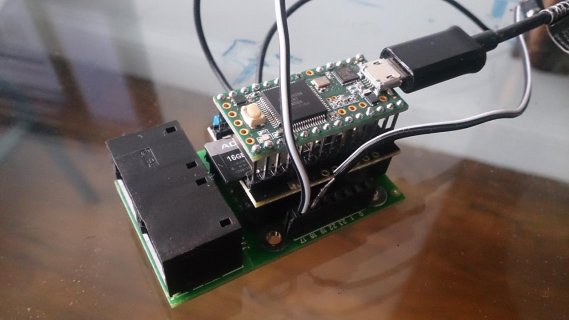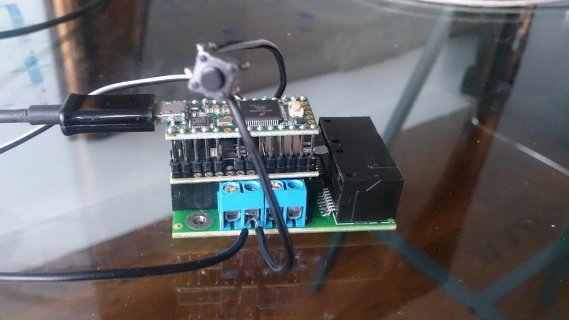Hello, I am using a button connected to pin 17 to switch the name of the video bin file to play off of the SD card. From what I understand, the file name changes correctly after a button press, but then after the first 512 byte buffer, the first byte is not "*" so it keeps closing the file and reading from the wrong location again.
I've added a few lines for debugging, so you can see the problem when this line, which should always be "42" for the "*" is a different number:
5 byte header can be read. first byte: 0
Complete Source Code (or a link to the code)
Screenshot or the exact text of any error messages
Not really an error message, but an example of output when a new file is read for first buffer only, then is unsuccessful:
is anything playing? y/n: 0
starting playing new file now:VIDEO.BIN
is anything playing? y/n: 1
playing is true, playing file num:1
5 byte header can be read. first byte: 42
first byte is an *
v: 7200 40000is anything playing? y/n: 1
playing is true, playing file num:1
5 byte header can be read. first byte: 0
error: unknown header, starts with
closing file: VIDEO.BIN
0
Which PJRC product you're using
Teesy3.1 + OctoWS2811 + SD card reader
Part numbers of any other chips or modules + links to their info
Simple tactile button
Wiring details - how exactly have you connected the hardware (a photo's worth 1000 words)


Software setup, Arduino vs C+makefile, running on Windows, Mac or Linux?Versions?
Arduino on Mac
Any other information needed to reproduce the problem.....
The ethernet cables aren't plugged in right now, but those are working fine. I'll add them back once the video presets are updating on button press.
Thanks for your advice/help!
I've added a few lines for debugging, so you can see the problem when this line, which should always be "42" for the "*" is a different number:
5 byte header can be read. first byte: 0
Complete Source Code (or a link to the code)
Code:
/* OctoWS2811 VideoSDcard.ino - Video on LEDs, played from SD Card
http://www.pjrc.com/teensy/td_libs_OctoWS2811.html
Copyright (c) 2014 Paul Stoffregen, PJRC.COM, LLC
*/
#include <OctoWS2811.h>
#include <SPI.h>
#include <SD.h>
#include <Wire.h>
#define LED_WIDTH 300 // number of LEDs horizontally
#define LED_HEIGHT 8 // number of LEDs vertically (must be multiple of 8)
//#define FILENAME
const int ledsPerStrip = LED_WIDTH * LED_HEIGHT / 8;
DMAMEM int displayMemory[ledsPerStrip*6];
int drawingMemory[ledsPerStrip*6];
elapsedMicros elapsedSinceLastFrame = 0;
bool playing = false;
OctoWS2811 leds(ledsPerStrip, displayMemory, drawingMemory, WS2811_800kHz);
File videofile;
// *************************added from multiButtonPress *************************
const int buttonPresetPin = 17; // the pin that the pushbutton is attached to
const int buttonResetPin = 18;
// button counter for Preset
int buttonPushCounter = 0; // counter for the number of button presses
int buttonState = 0; // current state of the button
int lastButtonState = 1; // previous state of the button
// button counter for Preset
int buttonPushCounterReset = 0; // counter for the number of button presses
int buttonStateReset = 0; // current state of the button
int lastButtonStateReset = 1; // previous state of the button
//setup for filename
//will eventually replace below with counting num of presets from SD card and storing names
int numPresets = 5;
char *filenames[] = { "T1A.BIN", "VIDEO.BIN","SYCHO.BIN","CURL.BIN","SWIPE.BIN" };
int curFileNum = 0;
//for SD card read
File root;
// ***************************************************************************
void setup() {
//added from multiButtonPress
pinMode(buttonPresetPin, INPUT_PULLUP);
pinMode(buttonResetPin, INPUT_PULLUP);
//FILENAME = filenames[ curFileNum ];
Serial.begin(9600);
while (!Serial){
//wait for serial to initalize
};
delay(50);
Serial.println("VideoSDcard");
leds.begin();
leds.show();
//added delay
delayMicroseconds(3600);
if (!SD.begin(3)) stopWithErrorMessage("Could not access SD card");
Serial.println("SD card ok");
//startNew("start from setup");
videofile = SD.open(filenames[ curFileNum ], FILE_READ);
if (!videofile) stopWithErrorMessage("Could not read file");
Serial.println("File opened");
playing = true;
elapsedSinceLastFrame = 0;
}
// read from the SD card, true=ok, false=unable to read
// the SD library is much faster if all reads are 512 bytes
// this function lets us easily read any size, but always
// requests data from the SD library in 512 byte blocks.
//
bool sd_card_read(void *ptr, unsigned int len) {
static unsigned char buffer[512];
static unsigned int bufpos = 0;
static unsigned int buflen = 0;
unsigned char *dest = (unsigned char *)ptr;
unsigned int n;
while (len > 0) {
if (buflen == 0) {
n = videofile.read(buffer, 512);
if (n == 0) return false;
buflen = n;
bufpos = 0;
}
unsigned int n = buflen;
if (n > len) n = len;
memcpy(dest, buffer + bufpos, n);
dest += n;
bufpos += n;
buflen -= n;
len -= n;
}
return true;
}
// skip past data from the SD card
void sd_card_skip(unsigned int len) {
unsigned char buf[256];
while (len > 0) {
unsigned int n = len;
if (n > sizeof(buf)) n = sizeof(buf);
sd_card_read(buf, n);
len -= n;
}
}
void loop() {
unsigned char header[5];
Serial.print("is anything playing? y/n: ");
Serial.println(playing);
delay(1000);
if (playing) {
Serial.print("playing is true, playing file num:");
//this number isn't updating after button press
Serial.println(curFileNum);
if (sd_card_read(header, 5)) {
Serial.print("5 byte header can be read. first byte: ");
Serial.println(header[0]);
if (header[0] == '*') {
Serial.println("first byte is an *");
// found an image frame
//Serial.println(header[]);
// Serial.println(header[0]);
// Serial.println(header[1]);
// Serial.println(header[2]);
// Serial.println(header[3]);
// Serial.println(header[4]);
unsigned int size = (header[1] | (header[2] << 8)) * 3;
unsigned int usec = header[3] | (header[4] << 8);
unsigned int readsize = size;
Serial.printf("v: %u %u", size, usec);
if (readsize > sizeof(drawingMemory)) {
readsize = sizeof(drawingMemory);
}
if (sd_card_read(drawingMemory, readsize)) {
while (elapsedSinceLastFrame < usec) ; // wait
elapsedSinceLastFrame -= usec;
leds.show();
} else {
error("unable to read video frame data");
return;
}
if (readsize < size) {
sd_card_skip(size - readsize);
}
} else {
error("unknown header, starts with ");
Serial.println(header[0]);
return;
}
} else {
error("unable to read 5-byte header");
// Serial.println(header[0]);
// Serial.println(header[1]);
// Serial.println(header[2]);
// Serial.println(header[3]);
// Serial.println(header[4]);
return;
}
} else {
delay(500);
Serial.print("starting playing new file now:");
//this number updates fine
Serial.println(filenames[ curFileNum ]);
videofile = SD.open(filenames[ curFileNum ], FILE_READ);
//Serial.print("name of file: ");
//Serial.println(filenames[ curFileNum ]);
if (videofile) {
//Serial.println("< is opened bc wasnt");
playing = true;
elapsedSinceLastFrame = 0;
}
}
// *************************added from multiButtonPress *************************
//FOR PRESET BUTTON
// read the pushbutton input pin:
buttonState = digitalRead(buttonPresetPin);
//Serial.println(buttonState);
// compare the buttonState to its previous state
if (buttonState != lastButtonState) {
// if the state has changed, increment the counter
if (buttonState == HIGH) {
// if the current state is HIGH then the button
// went from off to on:
Serial.println(filenames[ curFileNum ]);
Serial.println(SD.exists( filenames[ curFileNum ] ));
buttonPushCounter++;
if (curFileNum == (numPresets-1) ) {
//start over at 0
Serial.println("start over counter");
//error("new preset");
curFileNum = 0;
//return;
//error("new preset");
//startNew(filenames[ curFileNum ]);
} else {
//increment one preset
error("new preset");
curFileNum++;
//return;
//startNew(filenames[ curFileNum ]);
}
//Serial.println("on");
Serial.print("number of button pushes: ");
Serial.println(buttonPushCounter);
} else {
// if the current state is LOW then the button
// wend from on to off:
//Serial.println("off");
}
// Delay a little bit to avoid bouncing
//error("preset changed");
//startNew(filenames[ curFileNum ]);
delay(50);
//error("new preset");
//return;
}
// save the current state as the last state,
//for next time through the loop
lastButtonState = buttonState;
// ***************************************************************************
}
// when any error happens during playback, close the file and restart
void error(const char *str) {
Serial.print("error: ");
Serial.println(str);
Serial.print("closing file: ");
Serial.println(videofile.name());
videofile.close();
playing = false;
}
// when an error happens during setup, give up and print a message
// to the serial monitor.
void stopWithErrorMessage(const char *str) {
while (1) {
Serial.println("stopWithErrorMessage");
delay(1000);
}
}
//}Screenshot or the exact text of any error messages
Not really an error message, but an example of output when a new file is read for first buffer only, then is unsuccessful:
is anything playing? y/n: 0
starting playing new file now:VIDEO.BIN
is anything playing? y/n: 1
playing is true, playing file num:1
5 byte header can be read. first byte: 42
first byte is an *
v: 7200 40000is anything playing? y/n: 1
playing is true, playing file num:1
5 byte header can be read. first byte: 0
error: unknown header, starts with
closing file: VIDEO.BIN
0
Which PJRC product you're using
Teesy3.1 + OctoWS2811 + SD card reader
Part numbers of any other chips or modules + links to their info
Simple tactile button
Wiring details - how exactly have you connected the hardware (a photo's worth 1000 words)


Software setup, Arduino vs C+makefile, running on Windows, Mac or Linux?Versions?
Arduino on Mac
Any other information needed to reproduce the problem.....
The ethernet cables aren't plugged in right now, but those are working fine. I'll add them back once the video presets are updating on button press.
Thanks for your advice/help!

